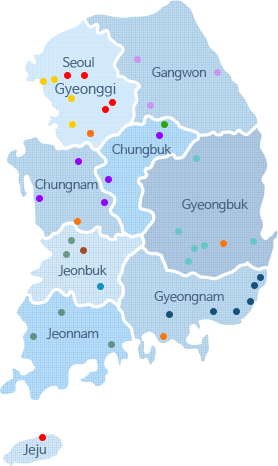KOPO Campuses
Click on each campus to view the campus’ website.

- Seoul.Gyeonggi: Jungsu, Kangseo, Seongnam, Convergence T.C, Incheon, Namincheon, Hwaseong, Gm Convergence T.C, Semi Convergence
- Gangwon : Chuncheon, Wonju, Gangneung
- Chungbuk : Chungju, Chungju, Dasom High School
- Chungnam : Daejun, Asan, Chungnam, Bio
- Gyeongbuk : Daegu, Namdaegu, Gumi, Pohang, Yeongju, Ym Convergence T.C, Robot
- Jeonbuk : Jeonbuk, Iksan, Human R.D, New Technology T.C
- Gyeongnam : Changwon, Busan, Ulsan, Dongbusan, Jinju, Petrochemical process T.C, Aviation
- Jeonnam : Gwangju, Jeonnam, Suncheon
- Jeju : Jeju
- Ⅰ
- Ⅱ
- Ⅲ
- Ⅳ
- Ⅴ
- Ⅵ
- Ⅶ
- Specialized campus
- Traning Center
- New Technology T.C
- Alternative technical high school
Metropolitan area
Gyeongsang
Jeju


